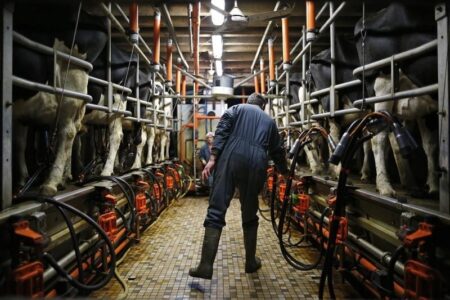By Leah Douglas
(Reuters) – U.S. Congress members from both political parties have been urging the Environmental Protection Agency not to propose a rule that would require farms to report on air emissions from animal waste, according to a letter seen by Reuters.
The EPA is soliciting public comment on whether it should revoke or amend a rule from former President Donald Trump’s administration that exempts animal manure from an environmental statute requiring industry to report chemical releases for the purpose of community information. Environmental groups want EPA to revoke the rule, saying pollution from animal waste is sickening people in rural communities.
Animal manure can generate hazardous chemicals like ammonia and hydrogen sulfide which can cause irritation and burning to the eyes and respiratory tract.
Reinstating the reporting requirement would create a paperwork backlog for EPA and regulatory burden for farmers, the representatives said in the letter, which was led by Republican Nick Langworthy and Democrat Jim Costa and signed by 44 others.
“While we understand the need to reduce GHG (greenhouse gas) emissions, requiring the reporting of air emissions from family farms in the future would put an unnecessary and unjustifiable burden on our nation’s agricultural producers,” said the letter, sent to EPA on Wednesday.
The letter is supported by top farm groups including the American Farm Bureau Federation, National Cattlemen’s Beef Association, and National Pork Producers Council, said a spokesperson for Langworthy.
The Biden administration in 2021 said it would revise or rescind the 2019 rule as part of ongoing litigation brought by environmental groups.
EPA’s comment solicitation indicates the agency is “waffling” on that commitment, said Tarah Heinzen, legal director at the environmental advocacy group Food & Water Watch.
“Air pollution from factory farms is absolutely sickening people in these rural communities, and they have absolutely no information about what they’re being exposed to,” Heinzen said.
The EPA did not immediately respond to a request for comment.
Read the full article here











